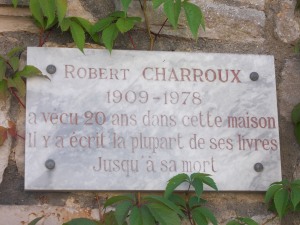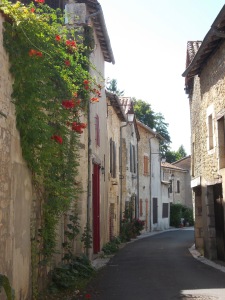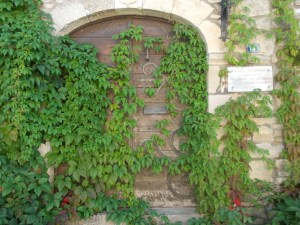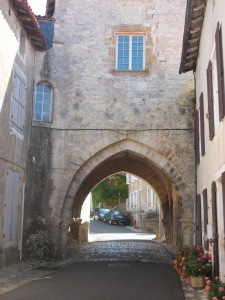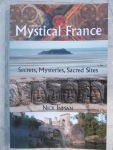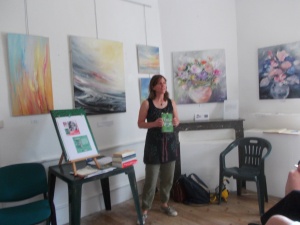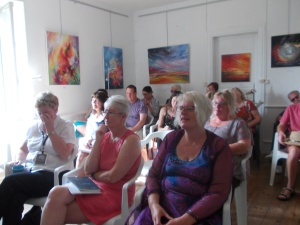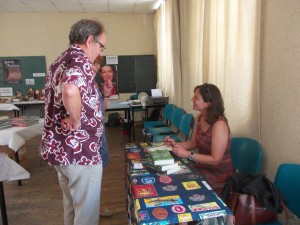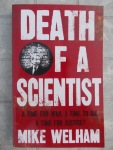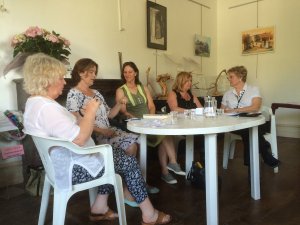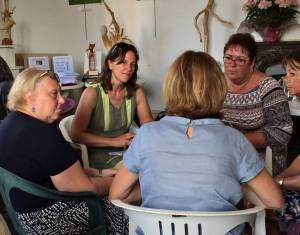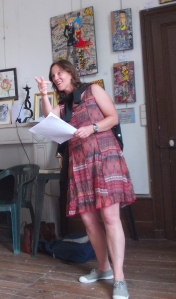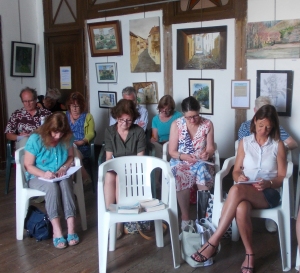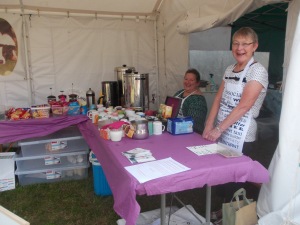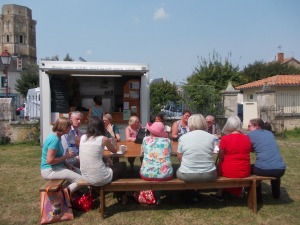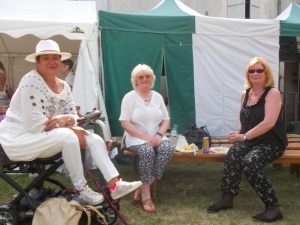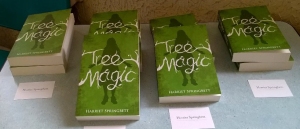The Waffly Bit (feel free to skip this part)
 Who is guilty?
Who is guilty?
What will my verdict be?
How come I was chosen to wear the wig?
(Who wants to give me Photoshop lessons?)
Law isn’t a subject that attracts me, so I never thought I would one day be Judge Harriet. The idea of holding someone’s life in my hands and of having to stand up in front of people and talk makes me feel sick.
Oh, wait a minute… something about both those activities sounds familiar (though the lives are fictional).
Anyway, I’m here today to talk to you about the controversial Segora case, which will be judged in June.
When Segora organisers Jocelyn and Gordon Simms invited me to be the judge for the short story section of this case, I hesitated. Should stories compete with each other? Could I make a decision? Would the wig suit me?
Then I came up with a cunning plan: I would enter a story and judge it the winner. I quickly accepted their invitation.
Unfortunately, they somehow predicted my cunning plan and nipped it in the bud.
(Had I used clichés like that in my story, I definitely wouldn’t have been able to pull the wool over their eyes and declare myself the winner).
Seriously, Gordon & Jocelyn probably invited me to judge because they’d run out of options my story Quark Soup was one of the winners in 2016, and Shingle and Sand was Commended in 2015. And I accepted because I love reading and analysing fiction. I’m also a big fan of the Simms, who have brightened English literary life in France with their bilingual literary festivals and workshops.
I feel very honoured to be a judge (wig or no wig), and I already know I’m going to be humbled by the quality of the stories.
Without more ado, here are some insights into what Segora is all about. First, you’ll find the facts about the short story competition – there are also vignette, poetry and one act play sections in the competition. Then there’s a Q&A interview with Jocelyn and Gordon Simms. And finally I’ve added tips from some of the previous short story judges, who kindly agreed to contribute. Thanks very much to Amanda Hodgkinson, Emma Curtis and Clare Le May. You are stars!
The Bare Bare Facts (no photos please)

Salle du Jardin du Cloître (presentation evening)
Length: 1500-3000 words
Closing Date: 15 June 2018
Entry fee: £7 per story
Prizes: 1st £300; 2nd £50; 3rd £30
Presentation evening in France
All proceeds go to the charity Médecins Sans Frontières
Please see the website for full rules and lots more details, including a photo of a fine young man masquerading as Gordon.
Q&A interview with organisers Jocelyn & Gordon Simms
How did you discover my cunning plan?
Jocelyn, what inspired you to launch the Segora competitions in 2007?
Well it was around my 60th birthday when I said wouldn’t it be fun to have a website and launch a poetry competition? Gordon was somewhat dubious about my idea (a worrying trait I have noticed over the last 40 years) but I persuaded him that it was a nice thing to do as he had won lots of poetry competitions and it might help other poets to get published. In those days there weren’t so many competitions for writers. We decided to encourage the art of short story writing at the same time.
Why ‘Segora’?
Segora is the Roman name of St Clémentin, the village where we lived. It was rumoured to be a lost Roman city, a crossroad where the routes between Nantes/Poitiers and Angers/Saintes intersected. Indeed, Roman remains have been found there. I liked the sound of it on my tongue and it already presented a mystery (no bad thing for writers).
Can you tell us a little about previous short story winners?
Our first short story judge was Dr Phoebe Lambert, a very close friend and former head of an FE college. I clearly remember reading the winning story in bed one night. It was by Graham Minett. I was so pleased it was chosen. It is still for me one of the most sensitive and memorable stories we have ever received.
Later we asked Graham to judge the competition and he chose Emma Curtis. Both of them are now flourishing authors and it is really a great pleasure to think that winning the Segora competition was instrumental in their decision to become full-time writers. Emma has won the competition twice with beautifully constructed, unusual stories spiced with a touch of menace.
A finalist, Claire Adam, was so delighted with her prize cheque she decided to frame it for the purpose of inspiration. She is soon to be published by Faber. Another Segora entrant, Bruce Harris, has recently had a collection of short stories, Odds Against, published by Earlyworks Press.
And what are your favourite, least favourite and most memorable parts?
One of the nicest aspects of running an International competition is contact with people from different countries. One of the worst aspects is trying to explain the rules. A particularly memorable occasion was one of our presentation days, which we included in the St. Clémentin Litfest, with three judges and half-a-dozen prize-winners in attendance.
Any new projects in view?
Now we live in St André-sur-Sèvre, where we held a Segora presentation day last year – a most enjoyable event which will be repeated in 2018. Our commitment to creativity has not gone unnoticed and this year we are involved in putting on a mini festival alongside a painting exhibition taking place during the weekend 21/22 April in St André. Once again the love of words, language and culture unites people. It is our currency!

Jocelyn and Gordon are kind and inspirational as well as being superb writers (they also have good taste in judges). Please support them and Médecins Sans Frontières by entering their poetry, play, vignette or short story competitions.
Facebook page and Website
Tips from Past Judges
Clare Le May was runner up in 2012 with Missing Persons, which appears in her collection Twisting Tales, published by Webvivant Press :
“It was a privilege to be a judge, and I enjoyed the exposure to such a huge range of writing styles. What made some stories stand out more than others included an interesting choice of theme, an intriguing twist and evocative writing, sometimes all three. But it was difficult to rank one above another, like asking if an impressionist painting is better than a classical. In the end I chose the stories that seemed to be uncovering a truth, leaving me with something of value, that in some way, however small, had changed the way I thought about the world.”
Emma Curtis is published by Transworld and is the author of two psychological thrillers: One Little Mistake and When I Find You. Twitter: @emmacurtisbooks Instagram: @emmacurtisauthor :
“It was a huge honour to be asked to judge the Segora Short Story Competition in 2017, and so interesting to be on the other side of the fence. Judging is an instinctive task, as well as an academic one, but story should always come first. Having said that, a writer needs skill to chip something beautiful out of a block of words and grammar. Their story must be compelling; it has to shine. Once I had my shortlist, I went back to how each entry made me feel. It was a balance between the tangible: voice, narrative arc, pacing, style, etc. and what the story-teller in me was drawn to. In the end, as well as First, Second and Third, I awarded two Highly-Commended and two Commended. I know from experience exactly how much any placing means to an aspiring writer.”
Amanda Hodgkinson is the award-winning internationally bestselling author of 22 Britannia Road and Spilt Milk, and novella Tin Town in the anthology Grand Central. Her novels have been translated into 16 languages and have won and been nominated for literary prizes in Europe and in the UK. Amanda holds an MA and a PhD in Creative Writing and teaches Creative Writing at the University of Suffolk in England:
“It’s a great honour to judge a short story competition and a serious undertaking too. But overall, what an absolute pleasure to be the one who can choose the winner. And how does a judge choose a winner? For me, I look for stories that stay with me. I want to find the story whose characters are still in my head long after I have finished reading. I wager that if asked, all short story judges will tell you this too. It will be the story you want to discuss with other people. You might even feel like you want to press copies of the winning story into the hands of friends and family, saying, ‘You mustread this.’ For me, that desire to share what you have read with others is the mark of a really good piece of writing. Fiction is such a powerful way of communicating between ourselves and connecting in endless ways with the world. Really, I believe that short story competitions are vital to writers and readers. Long may they continue!”
(I was lucky enough to go to one of Amanda’s talks, and you can see my blog post about it here.)
The End (well done, you made it to the bottom of the page)
I will of course be applying all the above advice when June arrives and it’s my turn to judge. In the meantime, happy writing and thank you for reading this long, long post.
And, once again, here are the Segora Facebook page and Website

 I said ‘yes’ because, actually, I have loads of questions I’d like to ask poet-novelist-journalist-creative writing teacher-TV documentary director-royal literary fund fellow Maggie Butt.
I said ‘yes’ because, actually, I have loads of questions I’d like to ask poet-novelist-journalist-creative writing teacher-TV documentary director-royal literary fund fellow Maggie Butt.





